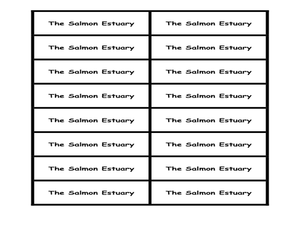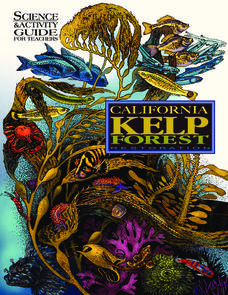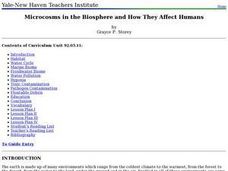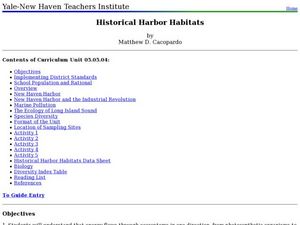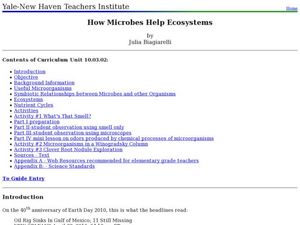Curated OER
Fishing for Solutions
Students investigate the many ecological and economic issues related to over fishing the world's marine resources. Working in committees, students research the related topics of equipment and fishing techniques.
Bonneville
The Problem of Plastic Trash Islands
Trash collection can be a hassle, especially out in the ocean. The second of four parts in the Adrift in a Sea of Plastic unit has pupils research plastic trash islands in marine ecosystems. They investigate why they occur and potential...
Polar Trec
Arctic Smorgasbord!
Two blooms of phytoplankton, instead of just one, now occur in the Arctic due to declining sea ice, which will have widespread effects on the marine life and climate. In small groups, participants build an Arctic food web with given...
Curated OER
The Salmon Estuary And Human Impacts
Learners have discussions and complete activities about the pacific salmon life cycle and marine parasites. In this salmon lesson plan, students complete activities such as observing sea lice, playing a tag game, and a board game.
Dawn N . Ericson
California Kelp Forest Restoration
This unit is so cool, you won't be able to "kelp" yourself! Intended for all grades, this science and activity guide for teachers offers a unique opportunity to understand kelp's role as a valuable ecological resource. Teachers and...
Curated OER
Sound for Sight
Learners study echolocation and understand how dolphins use it to locate prey, escape predators, and navigate their environment. They view a video, "In the Wild-Dolphins with Robin Williams" and see first hand how dolphins communicate. ...
Curated OER
2005 Hidden Ocean Expedition What's Eating You?
Analyze data and make inferences about the trophic position of organisms in the Canada marine food web. After a review of the geography and formula, discuss results and write an essay to improve the understanding of Artic food webs.
NOAA
The Dead Zone
The fifth installment of a 23-part NOAA Enrichment in Marine sciences and Oceanography (NEMO) program defines dead zones and how they form. Pupils then examine data from the Gulf of Mexico to determine dead zone formation.
Curated OER
Plant Lifecycles
Students examine the life cycle of plants. In this plants lesson plan, students identify the various stages of plants and their parts. Students compare the life cycle of a plant with that of an animal. Activities suggested can be...
Curated OER
environment: Fresh and Saltwater Habitats
Students compare and contrast fresh and salt water coastal environments. After describing how sea animals adapt to their habitats, they design a variety of sea creatures and explain how the adaptations aid in the animals' survival. ...
NOAA
Ocean Layers I
How is it possible for ocean water to have layers? The sixth installment of a 23-part NOAA Enrichment in Marine sciences and Oceanography (NEMO) program investigates factors that cause different water densities to occur. Experiments...
NOAA
Biological Oceanographic Investigations – Signals from the Deep
The Deepwater Horizon oil spill directly impacted an area of the Gulf of Mexico the size of Oklahoma. A marine biology lesson looks at the impact of an oil spill on the deeper parts of the ocean. Scholars download actual data collected...
Curated OER
Under the Sea - KWL Chart
Students create a KWL chart to start the discussion on ocean animals. They practice sorting the animals into their different classifications. They use indexes, table of contents and glossary to find information.
Curated OER
Marine Protected Areas (MPA)
Ninth graders explain the purpose of MPA's. In this biology lesson plan, 9th graders identify MPA's in Southern California. They simulate coastal sampling using candy from two buckets. Students analyze their results and share it with the...
Curated OER
Marine Field Trip to Whytecliff Park
Students study the intertidal habitat, tidal pools and the organisms that live in them. In this aquatic ecosystems lesson students take a field trip and experience first hand the local seashore environment.
Florida International University
Design Your Own
Apply scientific principles to designing an experiment to study organisms living on the coral reef in our oceans. Through reading, individuals learn about the coral reef ecosystem and important factors that affect its function. Using the...
Curated OER
Science: Microcosms in the Biosphere
In a series of lessons, examine the impact on humans by microcosms in the biosphere. Among the plans structured for students with different abilities and learning styles, are activities describing the symbiotic relationship, drawing the...
Curated OER
Treasures in Jeopardy
In small groups, middle schoolers research deep-sea coral reefs and design a poster to educate the public about their importance. They compare them to shallow-water reefs and consider the impact of bottom-trawl fishing. Many internet...
Curated OER
Historical Harbor Habitats
Tenth graders create food web displays in the classroom. In this ecology instructional activity, 10th graders identify the different pollutants in the environment and their effect on organisms. They collect samples of sediments from the...
Curated OER
Discovering the Deep
Learners explore the world's oceans. They research questions about the oceans and write a research report about an ocean animal. Students identify at least four different writing genres they experienced while reading about the ocean.
Curated OER
Oceanography Research
Fifth graders locate information on a specific ocean animal using encyclopedias, nonfiction books, SIRS Discoverer, multimedia encyclopedias, and the Internet. They create an acrostic poem about the ocean animal they have been researching.
Curated OER
How Microbes Help Ecosystems
Sixth graders observe different microorganisms under the microscope. In this biology lesson, 6th graders draw and describe the samples they see. They study the root nodules of plants and explain how the plants benefit from those bacteria.
Curated OER
The Gulf of Maine
Pupils examine their own environments and make connections to larger ecosystems. They watch a video about the gulf of Maine and record the changes that have occurred. They research the gulf and create a food web.
Curated OER
Make an Edible Coral Reef
Students create an edible coral reef out of food and candy. In this Science lesson, students explore what a coral reef is and the coral reef's importance to the ecosystem. Additionally, students discover the different parts of a coral...





